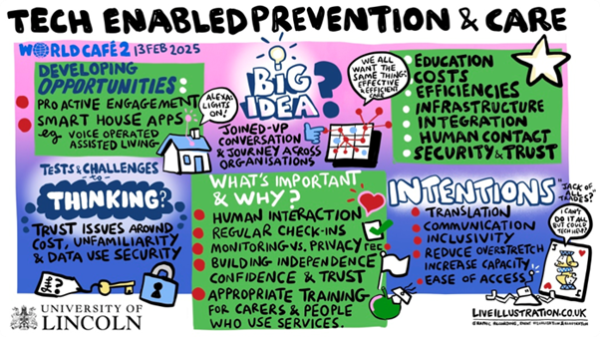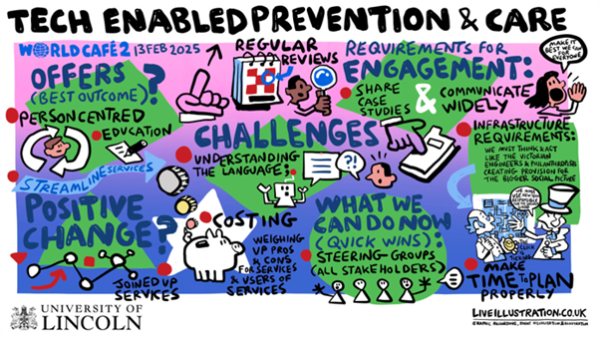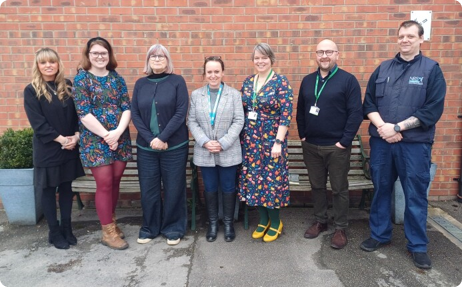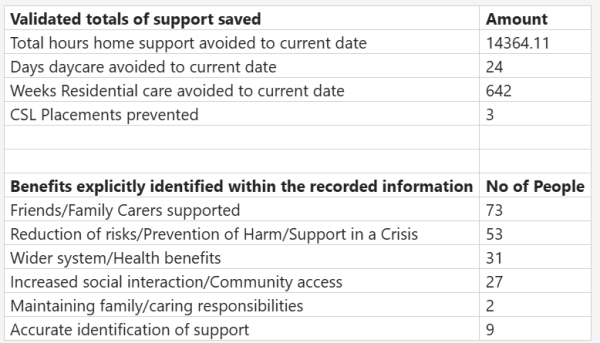Digital Technology
Technology is advancing and becoming more available and easier to use, meaning that more people are using it in their everyday lives.
There is significant potential for the transformation of health and social care through better and widespread use of digital technologies. This includes a growing role for technology in supporting people to monitor and manage their health and wellbeing, and also enhancing people’s experience of accessing services.
People are embracing new technology and increasingly expect their care to be supported by it.
Using technology can mean that people:
- are more independent
- can better manage their health conditions
- have more choice and control over when, where, and how to complete everyday tasks
- can remain safer and stay in their own homes for longer
Lincolnshire County Council is leading on using Technology Enabled Care (TEC) to continue to work with people to support them to use technology within their lives which in turn may help them to remain more independent.
In It's All About People Podcast Episode 22, we talked to Becs and Amy from Lincolnshire County Council's Adult Social Care team, and Shaun, an expert by experience, about the innovative use of technology to support Lincolnshire people to live and work safely. CLICK ON THE IMAGE in the side panel to listen to the podcast.
An ongoing programme of information sharing, reflective practice, and working alongside our area teams to support them, continues to take place to ensure this approach is sustainable. This practice is now being encouraged across the whole of Lincolnshire's health and care system.
Another area that we are developing in Lincolnshire, is how we use technology to enable us to work more efficiently, freeing up more time to spend working directly with people and preventing them from having to repeat their stories. This continues to develop.

Technology Enabled Prevention and Care (TEPaC) update - February 2025The following report was drawn from the Lincolnshire County Council Transformation team intranet page (Technology Enabled Prevention and Care Pilot (TEPaC) Update - February 2025). Around 40 key stakeholders from a range of workplaces and roles attended a Digital Technology in Care event on 13 February as part of the Technology Enabled Prevention and Care Pilot (TEPaC). This was an opportunity to explore ideas, share knowledge, collect insights, and help to develop ways of providing technology-enabled prevention and care. Attendees were also able to see for themselves the equipment available. For more information about the areas and questions explored at the event, see the images below: |

![]()

The Technology Enabled Prevention and Care Pilot launched a year ago, in February 2024, with a key aim of exploring how technology can be used to enable people to remain independent for longer.
Over the last 12 months the TEPaC group has trialled a wide range of technologies that could be introduced to support Lincolnshire residents accessing adult care. This work is supporting decision-making around the future use and delivery of Technology Enabled Care (TEC).
Technologies range from smart plugs and motion sensors around the home, watches with pedometers, GPS trackers, Vocala (Amazon Echo Show devices), along with a range of apps that support people's independence.
The technologies being explored provide a range of benefits for users, including:
- Making communications with loved ones easier
- Raising timely alerts when people are in need of support
- Helping people to pro-actively manage health conditions
- Creating more cost-effective methods of delivering social care
Benefits in action
The TEPaC pilot is already reaping benefits for Lincolnshire residents.
In one case a woman with Parkinson’s disease, who is confined to her bed, has used Vocala with voice control to listen to music and, with the introduction of smart bulbs, turn her lights on and off. She now also keeps in touch with her family via video calls.
The introduction of these simple but key elements of technology have reduced the number of social care visits the woman requires, have grown her independence, and improved her mental health.

![]()
The TEPaC Project Team: Stacey McNicholas, Lincolnshire County Council (LCC), Amy Pitts (LCC), Mo Ray (University of Lincoln), Emma Charles (NRS Healthcare), Rebecca Alton (LCC), Theo Jarratt (LCC), and Dan Clarke (NRS Healthcare)
TEPaC achievements to date
The TEPaC pilot had has now established a service model for provision of TEC, with a robust process for referrals, including monitoring and reporting of benefits.
Up to mid-February 2025, the impacts of TEC are as follows:

The TEPaC team have also:
- Identified wider system benefits to Police & NHS services.
- Gathered views from professionals and people who use care, on the nature of a future care technology service in Lincolnshire.
- Developed an understanding of what TEC is most appropriate for different needs.
The benefits are still being measured and continue to increase. The next steps to scale up the use of TEC across adult social care are now being considered by the Corporate Leadership Team.

Technology Enabled Prevention and Care (TEPaC) update - October 2025
A Technology Enabled Prevention and Care (TEPaC) update from Amy Pitts, Social Care Digital Technology Ambassador (Associate Lead Professional), Adult Care & Community Wellbeing, Lincolnshire County Council.
In November 2021, we set out on a journey to explore how technology could help people across Lincolnshire live the lives they want, for as long as possible, in the place they call home.
This led to the Technology Enabled Prevention and Care (TEPaC) Pilot, which launched in February 2024.
Working closely with a technology provider, we offered a range of devices and digital tools for people to try. But this wasn’t just about gadgets or innovation for its own sake — it was about understanding what really makes a difference for real people in everyday life.
The aim was simple:
· To help people to stay independent.
· To support family, and family and friend carers.
· To reduce the need for more formal care or residential placements.
The University of Lincoln independently evaluated the pilot, listening to people’s stories and measuring the impact on their lives.
PLEASE NOTE: The people's stories included below are real, but the names of individuals have been changed to protect confidentiality.

What Did We Learn?
Technology helps to build confidence and independence
Many people told us that technology became a bridge to confidence and freedom. GPS pendants, watches, room sensors, and apps helped them to feel safer, less anxious, and more independent at home.
- Fiona’s story: After an illness, Fiona lost confidence in going out alone. Her GPS pendant changed that, giving her the confidence to go out by herself and making it possible to visit her children.
For many, these tools are providing reassurance not just for themselves, but for their families too.

Technology supports family and friend carers
Technology works best when it fits into existing networks of care - families, friends, neighbours, and communities. For family and friend carers, having digital tools in place has meant peace of mind and the freedom to continue caring, knowing there is a safety net if something goes wrong.
- Pieter’s story: Pieter’s daughter was able to keep supporting her Dad to walk to her house independently, knowing she could quickly find him if he got lost. The technology reduced her worry and helped Pieter stay at home for longer, while also supporting homecare workers to keep him safe.
In this way, technology doesn’t take away the human connection; it helps it flourish.

Technology delays or reduces the need for formal care
For some, technology has been key to maintaining daily routines, such as remembering medication or monitoring wellbeing, without needing additional visits from paid carers.
- John’s story: John’s daughter, Meryl, used home monitoring tools to keep an eye on his wellbeing and medication. This meant John could stay safely at home, surrounded by the things, and people, he loved.
Technology worked here because it began with understanding John’s needs, preferences, and his family’s role in his care.

Technology can help to enhance wellbeing and quality of life
Technology isn’t just practical - it isn't just about safety or independence. It’s also about comfort, companionship, and emotional wellbeing - helping people stay connected and feel part of something bigger.
- Alice’s story: Alice, who lives with chronic pain and anxiety, described the Brain in Hand app as “life-saving”, helping her manage her feelings and build new routines.
- Libby’s story: Libby, who has learning disabilities, found comfort and routine in a robotic companion cat, which helped her settle into her new home.
- Irene’s story: Irene, who spends most of her time in bed, said her smart speaker “transformed” her life by letting her control her environment and see her son’s face on video calls.

Technology - what matters most
The TEPaC pilot reminds us that technology only works when it starts with people.
Technology is not a one-size-fits-all solution. It works best when it’s personal, flexible, and part of a wider web of support: family, friends, neighbours, and community.
The pilot also highlighted the importance of choice, clear information, and respecting people’s privacy and preferences.

Technology-Enabled Prevention and Care - looking ahead
As we look to the future, the TEPaC pilot is a reminder that people must always come first.
By listening, learning, and working together, we can use technology not as the answer, but as an enabler - one that helps everyone in Lincolnshire live their best life, in their own way, for as long as possible.








